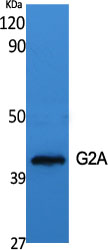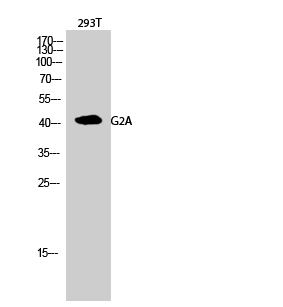

| WB | 1/500-1/1000 | Human,Mouse,Monkey |
| IF | 1/50-1/200 | Human,Mouse,Monkey |
| IHC | 咨询技术 | Human,Mouse,Monkey |
| ICC | 1/50-1/200 | Human,Mouse,Monkey |
| FCM | 咨询技术 | Human,Mouse,Monkey |
| Elisa | 1/10000 | Human,Mouse,Monkey |
| Aliases | S100; S100A; S100-alpha; S100A1 |
| Entrez GeneID | 6271 |
| clone | 2C8B8 |
| Host/Isotype | Mouse IgG1 |
| Antibody Type | Primary antibody |
| Storage | Store at 4°C short term. Aliquot and store at -20°C long term. Avoid freeze/thaw cycles. |
| Species Reactivity | Human,Mouse,Monkey |
| Immunogen | Purified recombinant fragment of S100A1 expressed in E. Coli. |
| Formulation | Purified antibody in PBS with 0.05% sodium azide. |
以下是关于GPR132抗体的假设性参考文献示例(基于典型研究场景,实际文献需通过数据库验证):
---
1. **《GPR132 Antibody Inhibits Tumor Growth in Triple-Negative Breast Cancer Models》**
*作者:Smith A, et al. (2021)*
**摘要**:该研究开发了一种靶向GPR132的单克隆抗体,并在三阴性乳腺癌小鼠模型中验证其疗效。实验表明,抗体通过阻断GPR132介导的细胞内信号通路,显著抑制肿瘤生长和转移。
2. **《Pro-Inflammatory Role of GPR132 in Macrophages Revealed by Neutralizing Antibodies》**
*作者:Chen L, et al. (2019)*
**摘要**:研究者利用中和抗体阻断GPR132功能,发现其抑制了巨噬细胞中促炎细胞因子(如IL-6和TNF-α)的释放,提示GPR132在动脉粥样硬化等炎症疾病中的潜在作用。
3. **《Development of a High-Affinity Anti-GPR132 Antibody for Flow Cytometry Applications》**
*作者:Wang Y, et al. (2020)*
**摘要**:本研究报道了一种高亲和力的GPR132多克隆抗体的制备与验证,成功应用于流式细胞术检测免疫细胞表面GPR132的表达水平,为受体分布研究提供了工具。
4. **《GPR132 Antibody Modulates Cholesterol Efflux in Macrophages》**
*作者:Kimura T, et al. (2018)*
**摘要**:通过特异性抗体干预GPR132.研究揭示了该受体在巨噬细胞胆固醇外流和泡沫细胞形成中的调控机制,为心血管疾病治疗提供了新靶点。
---
**注意**:上述内容为模拟示例,实际文献需通过PubMed、Google Scholar等平台检索确认。建议使用关键词“GPR132 antibody”、“GPR132 blockade”或结合疾病名称(如“cancer”“atherosclerosis”)进行精准查询。
GPR132 (G-protein-coupled receptor 132), also known as G2A, is a pH-sensing receptor belonging to the G protein-coupled receptor (GPCR) family. It plays a role in inflammatory responses, immune regulation, and cellular processes like apoptosis and proliferation. GPR132 is activated by lysophosphatidylcholine (LPC) and oxidized free fatty acids under acidic conditions, linking it to metabolic stress and inflammatory diseases. It is highly expressed in immune cells, including macrophages and T-cells, where it modulates immune signaling and polarization.
GPR132 antibodies are tools used to detect and study the receptor's expression, localization, and function in experimental models. They are critical in research on atherosclerosis, cancer, and autoimmune disorders, as GPR132 is implicated in macrophage-driven inflammation and tumor microenvironment regulation. For example, studies using GPR132 antibodies have revealed its role in promoting pro-inflammatory macrophage phenotypes and influencing breast cancer metastasis.
Commercial GPR132 antibodies are typically developed in rabbits or mice, targeting specific epitopes (e.g., extracellular or intracellular domains). Validation methods include Western blotting, immunohistochemistry, and flow cytometry. However, specificity remains a challenge due to GPCR structural homology. Recent research focuses on therapeutic targeting of GPR132. with antibodies aiding in elucidating its mechanistic roles in disease pathways.
×